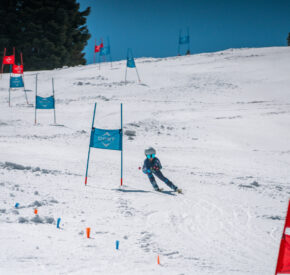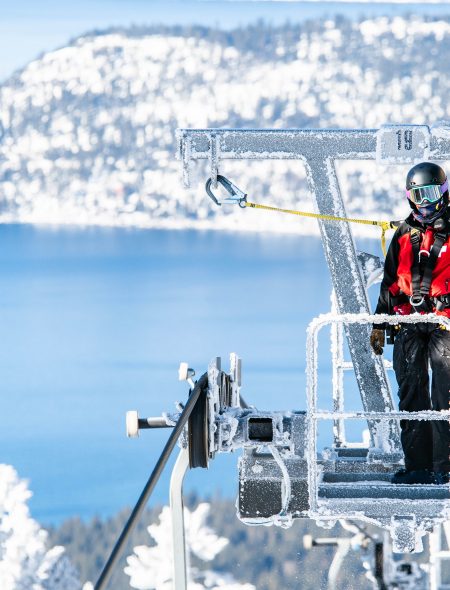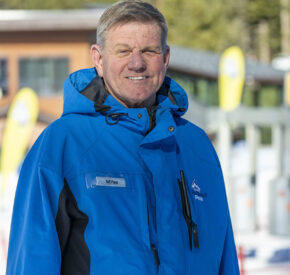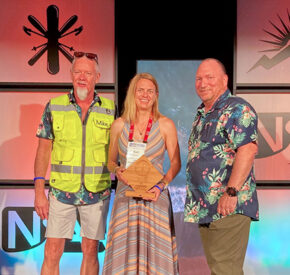

Diamonds in the Rough: Q&A with Diamond Peak’s female patrollers
Diamond Peak’s Patrol is comprised of diverse and dedicated individuals – both men and women, skiers and snowboarders – who are passionate about the mountains and safety. In a profession that has typically been dominated by men, the industry as a whole has seen an increase in female patrollers in recent years. Kari Brandt, Diamond Peak Patrol Director/Safety Coordinator and founder of Women of Patrol has played an integral part in inspiring and empowering other women patrollers on and off the clock. We caught up with Kari and her female counterparts – Camille Samuels, Claire Johnson and Taylor Parsons, to learn more about what it’s like being a woman on patrol.
What enticed you about pursuing a career in patrol?
Camille Samuels: I’ve loved the mountains and snow since I can remember. Being a first responder in an outdoor setting became appealing to me when I moved to the mountains four years ago. I also decided I wanted to pursue a career in medicine about the same time I got my Wilderness First Responder (WFR) and Emergency Medical Technician (EMT) certifications to be a patroller. The combination of skiing, applying emergency medicine skills in the field, and working as a first responder was right up my alley. Ski patrol combines all of these and brings in great people.
Claire Johnson: It combines snowboarding, skiing with medical. I love being an EMT, the environment being in the alpine climate. I get to do everything I love. I go home sometimes thinking I can’t believe I get paid to do this. Ski patrol has been a huge part of my life. I love it, it’s a huge passion of mine.
Kari Brandt: It combines all of my passions into one job. Skiing, caring for others, being physically active, rope rescue, problem solving, high stress situations and a close community amongst co-workers and other patrollers.
Taylor Parsons: I always wanted to do ski patrol but I thought you had to be a paramedic or an EMT but then my friend did ski patrol and said that all I needed was my WFR, so I took that through Sierra Nevada University and applied at DP.
Are there challenges to being a female patroller and how have you overcome these challenges?
Camille: I don’t think there is anything I can’t do that a male patroller can do in their job. I do not have the same physical strength as some of the male patrollers, so that can make some things more challenging. But you learn how to work around it. If you need an extra hand lifting a patient or something heavy, it is easy to get another patroller to help. I feel confident in my skiing ability with a loaded toboggan. I may not be as fast getting down the mountain as some of the guy patrollers, but I get the patient down safe and sound, and that is what matters.
Claire: It’s always a team with ski patrol. We have a daily brief and debrief to talk about what challenged us that day, what happened and other options. There are several ways to accomplish the same thing. There’s always new tricks to learn. If I hit a challenge I have a fellow patroller there that might have experience with something that I don’t, we’re stronger together.
Kari: Many times people doubt a female’s ability to do the job as well as a male. Some guests specifically ask for a male when a female shows up with a toboggan to an accident. Proving you can do the job just as well as any male is sometimes the hardest thing to do.
Taylor: This is my first year as a patroller and the director is a female, so I have not yet faced any challenges by being a female patroller, If anything I feel empowered to be a female in the patrol field.
How do you think having women on the team benefits the patrol?
Camille: I think it makes the team more diverse, which is always a good thing. I think sometimes women and men think a little differently, so having different perspectives and thought processes brings strength to the team. It also helps for female patients from time to time. Depending on the injury, a female patient/skier may be more comfortable having a female patroller as the responder to their injury. The same thing goes for males. A male patient could very well prefer having a male patroller as the first line of care depending on the situation. I also think it is great for kids to see female patrollers on the mountains. It is still a male dominated profession. I don’t remember seeing females in red jackets on the mountain as a kid. I only remember ski patrollers being men. It’s just what I saw. It is especially good for little girls to see women working as patrollers because it opens their mind to a career they may want to pursue in their future, and see that it is not uncommon for a woman to be in a red jacket with a medical cross.
Claire: There’s something subtly different when you’re in a mixed group. If it’s all guys, it changes the dynamic; and if you throw a girl in there, the vibe changes again – it gets friendlier and more fun. It levels things out and keeps it balanced.
Kari: Any diversity amongst a team makes a team better. A patrol team is best with a variety of people with different strengths. Having women on a team brings a more open environment. In regards to the physical aspects of the job, a woman tends to perform those tasks with more finesse rather than muscling their way through the tasks.
Taylor: I think by being a woman of patrol it inspires other women to be more confident and become patrollers themselves.
What do you like about working at Diamond Peak?
Camille: Diamond Peak is the only resort I have worked for. Kari has created a culture of inclusiveness for both women and men. She keeps her team diverse. Everyone works together to get the job done despite personality differences, as well as strengths and weaknesses amongst the patrollers. The patrollers here are not in a competition with each other. Everyone is humble enough to work together to do the right thing. It is a very welcoming environment to work in. I imagine that it may not be that way at other resorts depending on the leadership.
Claire: The views are unbelievable. I feel at home here, it’s a beautiful peaceful place. The people here are really exceptional as far as other experiences I’ve had in Tahoe. Seems like there’s more humble people which is really great. It’s a great team and Kari is really good at creating a fair work environment. I’ve been around long enough to be in the “good old boys club” – it’s a saying, an unspoken kind of hierarchy. It’s the culture of ski patrol and Kari is stripping down that culture. It’s not going to happen in a season, it’s going to take time but so far it’s been really great. If I’ve felt like I didn’t like what’s going on in a situation she’s been really great. That makes me want to be here, it’s refreshing.
Kari: Diamond Peak is a hidden gem. The skiing is great and it truly is a family environment. The management team at Diamond Peak is unlike any other I have worked on. Each department is always happy to help another and the support is amazing. We have some of the most skilled managers in the industry who all choose to work at Diamond Peak because of the positive and supportive work environment it provides.
Taylor: I grew up in Incline, so it is my home mountain and so being able to patrol here is an honor and it makes me more comfortable because I know it so well.
What kind of activities do you do in the off-season to further your skills and stay in shape for ski season?
Camille: I spend most of my off time trail running and rock climbing in the summer. Those activities seem to keep me strong enough for ski season. I also work as an EMT to keep learning and improving my basic medical skills.
Claire: I go nuts if I don’t get my blood pumping. Finding other outdoor things to do, climbing is really helpful because it has rope systems and that is part of ski patrol. If you don’t do these knots you forget. Staying active, slacklining is really good for balance and core. It’s easy to do, you only need a slackline. I’ve also been an EMT for 12 years. I work for a company who does music festivals and sporting events, supervising a team
Kari: I do a lot of trail running and mountain biking in the off-season. These activities are not specifically to keep me in shape for ski season, but they definitely do. I just enjoy moving my body in the mountains so I spend a lot of hours doing exactly that.
Taylor: I consider myself a very active person so I hike, run, workout, paddleboard and wake surf during the summer to stay active.
Do you have any advice or words of encouragement for other women thinking about working or volunteering in Patrol (or other male-dominated industries)?
Camille: Be confident in yourself and your abilities. There’s no reason why you can’t keep up with the boys. Everyone has strengths and weaknesses. Use your strengths to shine. Figure out your weaknesses and turn them into strengths; this takes time and that is okay.
Claire: If you’ve been thinking about it at all or thought “I would like to at least try that” come into the First Aid/Patrol Office to talk to one of us or Kari especially and get advice. See if you can come out and shadow us, take a ride in the toboggan when we’re not too busy. Don’t be afraid, we’re friendly people.
Kari: Most of all, believe in yourself and your abilities to do the job! Often we are our own worst critics. Also, find the people who support and encourage you. Mentorship and a supportive team will make your experience so much more positive! Lastly, speak up if you are not being treated as an equal. If we don’t raise awareness to being treated differently we can never expect it to change.
Taylor: My advice for women joining ski patrol would be to not give up, give it your all and pursue your passions.
This article originally appeared in the April 2021 IVGID Quarterly Magazine. View this issue and other issues on the IVGID Quarterly page.


